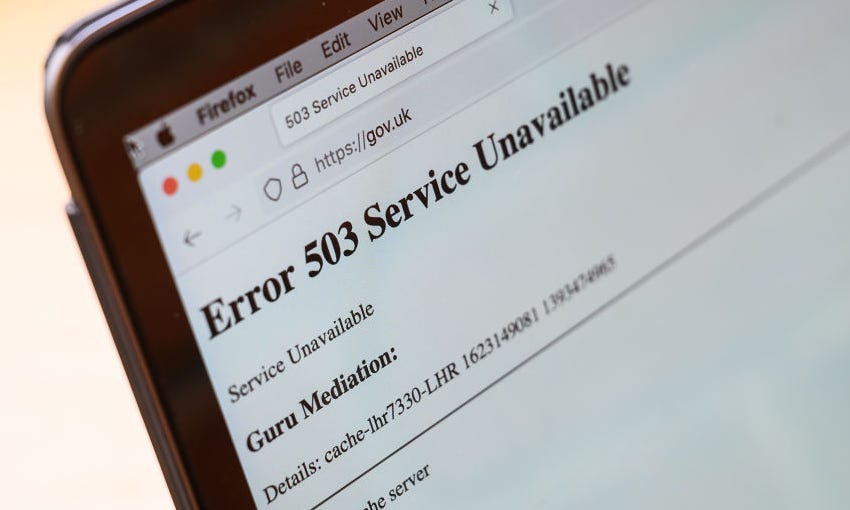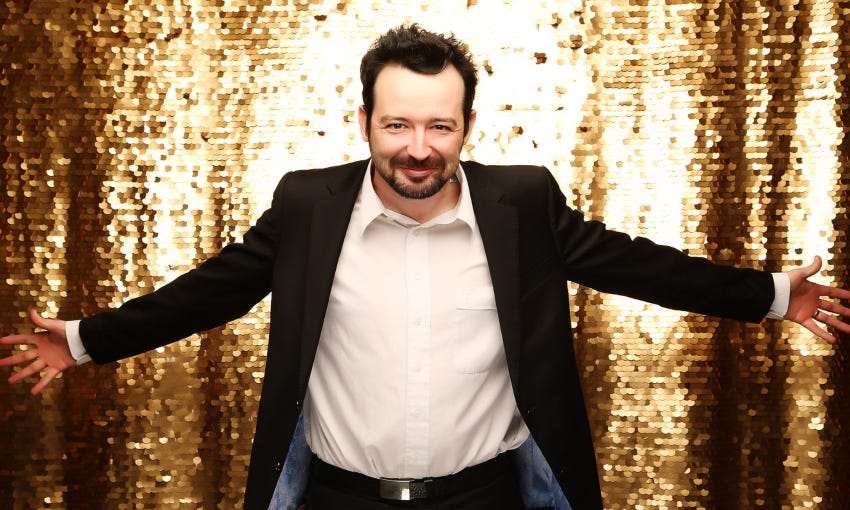Global internet outage sparks fear of cyberattack
But really, it was caused by something far more boring.
Good morning and welcome to The Bulletin for Wednesday June 9. I’m Stewart Sowman-Lund, filling in for Alex until next Monday. Presented in partnership with Z Energy.
In today’s edition: Half of the world’s internet crashed overnight, the Climate Change Commission’s advice for slashing emissions will be made public today, and there’ll soon be enough Pfizer jabs to fully vaccinate a million New Zealanders.
(Image: Getty Images)
A company you’ve probably never heard of caused half the internet to go dark late last night. As The Guardian explains, thousands of major websites went offline for around an hour or so about 10pm NZT. That included: major online retailers like Amazon and Ebay, websites linked to the UK government, streaming services like Spotify, Reddit and news media such as the New York Times. Here in New Zealand, sites like TradeMe, TVNZ and RNZ were impacted.
The outage, which quickly dominated online discussion on surviving forums like Twitter, appears to have been caused by US-based cloud company Fastly Inc crashing. Never heard of Fastly? Neither, I doubt many people will have. Fastly is a CDN – or content delivery network. I don’t really know what that means either but CNBC has a handy explainer on the subject. Basically, Fastly provides a service that allows popular websites to keep copies of their pages closer to their customers, speeding up load times. It’s how you can visit a website based in the UK and it loads at the same speed as The Spinoff does.
Was it caused by a cyberattack like what brought down the Waikato DHB systems recently? Apparently not. At first, it was thought that Fastly may have succumbed to some sort of attack causing half the internet to collapse. The actual problem appears to be far more technical/boring: the company said in a tweet that it had “identified a service configuration that triggered disruptions” globally. As of this morning, it appears the websites impacted have been brought back online.
Today’s the day the government will publicly release the advice it received on how to tackle emissions. The Climate Change Commission’s report – the result of more than 15,000 public submissions – will be tabled in parliament today, meaning we get to finally read it. James Shaw, the minister in charge, has had about a week to ponder its contents after it was given to the government ahead of the public release.
But, so far, he’s not giving much away. "There have been a lot of government agencies, a lot of industries and communities that have been waiting to see what the Commission was going to come out and say before triggering their decisions,” he told Newstalk ZB this week. Media will get the chance to scrutinise the report this morning followed by a public release around lunchtime.
What happens next? The government will have until the end of the year to act, Shaw said."Often with these things, like the Productivity Commission report, they provide their report and recommendations, the government's like 'hey, cool, thanks' but then quietly moves on. We actually legally don't have that option this time,” said Shaw. It doesn’t mean the government has to adopt all of the recommendations, just that the government needs to have responded to all of the recommendations before the start of 2022.
A million doses of the Pfizer vaccine will arrive in the country next month, ahead of the general public roll-out. As covered in our live updates yesterday, the incoming shipment will double the total number of Pfizer doses that have arrived this year to 1.9 million – roughly enough to vaccinate a million New Zealanders.
According to the government, this is great news. “[It’s] reassuring to see our vaccine supply ramping up,” said Covid-19 response minister Chris Hipkins. “It shows our plan for what is the biggest and most complex logistical undertaking ever by the health system is on track.”
But, according to National, it’s all a shambles. Once again, the opposition is criticising the government for proclaiming (last year) that we would be front of the queue for the vaccine. “New Zealand is the second slowest in the OECD and 115th in the entire world,” said the party’s Covid-19 response spokesperson Chris Bishop. “This is hardly the ‘year of the vaccine’ that the prime minister promised. The government still needs to explain why there are 3,800 border workers who are yet to have a single vaccine dose.”
The truth is, it’s probably somewhere in between “great” and “a shambles”. The doses will arrive in weekly drops, ramping up in quantity from mid-July as the wider population roll-out begins. This means that the government’s target of starting group four vaccinations by the end of next month is likely to happen – but the likelihood of clearing the vast backlog from groups one, two and three remains fairly slim.
Meanwhile, Jacinda Ardern has confirmed she will get her first jab “by the end of June”. The prime minister has long said she did not want to skip ahead of those more deserving of the Covid-19 vaccination, such as people with illnesses that could make catching the virus even more threatening. According to the Herald, the timing of Ardern’s jab will follow announcements relating to the scheduling of the roll-out to the general population. Stuff is reporting that ministers will meet on Monday to work out finer details regarding the public roll-out.
Thousands of our country’s nurses will be on strike today after the latest DHB pay offer was rejected. As Stuff explains, the eight hour strike (starting at 11am) will affect all public hospitals and DHB facilities. The strike was initiated after 30,000 members of the New Zealand Nurses’ Organisations (NZNO) voted to reject the most recent pay offer that would have provided a salary increase of “little more than 1.38%”. DHBs had also offered a lump sum payment of $4000, but advocate David Wait from the NZNO said that simply represented a part payment on back pay for their still-unsettled pay equity claim.
The Mongrel Mob has hit back after the police celebrated a major sting conducted alongside the FBI and Europol. Yesterday saw 35 people arrested on our shores, with 900 charges laid and $3.7 million in assets seized during a transnational police operation looking into organised crime. But the Waikato Mongrel Mob’s PR rep Louise Hutchinson has gone on the warpath after the news broke, labelling the arrests a “smear campaign” after some senior gang members were taken into custody. In a tweet, she blamed police, along with commissioner Andrew Coster, politicians and the mainstream media for spreading “spin” about the Waikato Mongrel Mob. She’s just wrapped up an extraordinary interview on RNZ which is worth a listen.
It’s been 100 days since the last case of community transmission in New Zealand. Stuff has counted the days and worked out the last case of Covid-19 with no distinct links to the border or managed isolation was way back at the end of February. Of course, since then, there have been almost daily cases detected at the border, not to mention the Grand Millennium worker who caught the virus.
In a dark contrast, more cases of Covid-19 were linked to the Melbourne cluster yesterday. Thankfully, just two new cases were reported and both were linked to the existing cluster. As the ABC reports, health officials have now been able to link the cluster to a recent returnee in managed isolation. "I can confirm today that we have now found a match between a returned traveller who entered hotel quarantine in Melbourne on the 8th of May and this cluster," said Victoria’s acting premier James Merlino. He confirmed that the state remains on track for an easing of restrictions on Friday.
New Zealanders stuck in Melbourne will be able to return home on special “green flights” from today – but it will be at their own expense. The unexpected Covid-19 lockdown started over a week ago, leaving New Zealanders taking advantage of the travel bubble stranded.
National MPs have hit back at comments made by one of their own – Paul Goldsmith. The party’s education spokesperson has faced flak after claiming that colonisation was "on balance" a good thing for Māori. He’s not yet backed down, but colleagues – including possible future leader Christopher Luxon – have condemned the comments after being asked by Newshub.
Got some feedback about The Bulletin, or anything in the news?
Get in touch with me at stewart@thespinoff.co.nz
Right now on The Spinoff: Chris Schulz meets comedian Sam Smith, who absolutely loves being a warm-up guy. Russell Brown takes a look at the just-announced changes happening at NZ Post. Donna Chisholm looks at the retirement sector, and the “systemic problems” that triggered the demand for reform (more on this below). Tara Ward continues with her thankless task to recap The Masked Singer. Justin Latif headed out to Pukekohe to visit a plant nursery helping young South Aucklanders find direction and jobs.
For a feature today, an extract from Donna Chisholm’s piece on The Spinoff looking at the retirement sector. The retirement commissioner has called for an overhaul of retirement village legislation after growing concerns that the rules favour operators over residents. Here’s a taster:
Delays in licence-to-occupy sales, ongoing fees after departure, accrual of the deferred management fee – which can mean capital continues to decrease the longer it takes for the unit to be reoccupied – and the lack of capital gain sharing are among the issues that have led to retirement commissioner Jane Wrightson’s review of the laws governing retirement villages. In a report released today, she says many of the residents’ concerns relate not to their time at the villages – during which they are generally content – but to what happens when they enter or leave.
It’s at the “moving on” stage of the process that residents or their families are often at their most vulnerable and not in a position to complain, says Wrightson’s report. It says the complex legal framework governing the sector is at risk of becoming “outdated and unfit for purpose” and the government must urgently review it to eliminate unfair terms in contracts and better protect consumers.
The report follows her release of a discussion paper in December calling for responses to proposals for reform, which attracted more than 3,000 submissions. If the government agrees to the review, it will be undertaken by the Ministry of Housing and Urban Development.
Wrightson says most village residents are comfortable with their choice of living arrangements and most operators provide very good services and care. She says the discussion paper “would have had a very different tone and feel had I come to the view that this was a corrupt industry designed to rip people off and providing substandard care. This is not the problem we have. The issue we have is a lightly-regulated industry that’s relatively young that is growing like Topsy and where I think protections for consumers are not quite right.”
That's it for The Bulletin. If you want to support the work we do at The Spinoff, please check out our membership programme. Thanks to Alex for letting me fill in, I’ll be back tomorrow.






